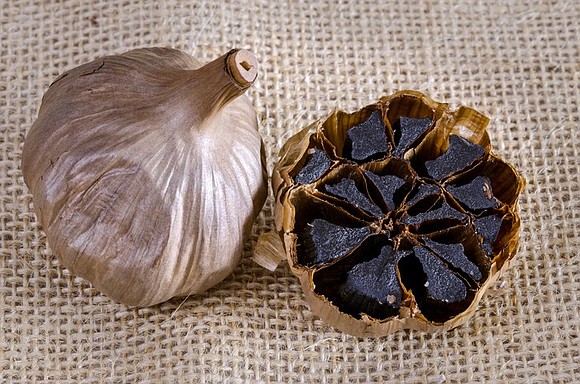Black Foods Diet: Black Is the New Green
Style Magazine Newswire | 5/19/2017, 12:06 p.m.
We all know about the great health benefits of green vegetables, but what about black veggies? Black foods have more antioxidants than light-colored foods because of their high pigment content. So in the words of Wesley Snipes, “Always bet on black.” Here’s five foods that prove why:
1. Black Garlic
Black garlic may look frightening but this aged version of garlic actually has twice the antioxidants of regular garlic. Described as being sweet and reminiscent of molasses, black garlic can be used as traditional garlic with delicious results.
In a 2009 mouse study, Japanese researchers found that black garlic was more effective than fresh garlic in reducing the size of tumors. The study was published in the journal Medicinal and Aromatic Plant Science and Technology.
Black garlic is packed with high concentrations of sulfurous compounds, especially one in particular: s-allylcycteine (SAC). Science has shown a number of health benefits from SAC, including stopping the formation of bad cholesterol.
2. Black Mushrooms
Bypass traditional button and Portobello mushrooms for shiitake, black trumpet, and what are called black forest mushrooms. A compound in these mushrooms stimulates the immune system and they contain an antioxidant that can help prevent premature aging and cancer. Start spouting off names like hen-of-the-woods, wild morels, and lion’s mane to impress people further.
The 5,000-year-old traditional Chinese medicinal system uses black mushrooms for high cholesterol, atherosclerosis and as a tonic to benefit your overall health. Traditional Japanese medicine employs black mushrooms to treat parasites, circulatory disorders, heart conditions and exhaustion.
3. Black Figs
Black or dark figs are a delicious summer fruit that can be perfectly paired with cheeses and tossed in salads. They are also very high in fiber, potassium, manganese, and a rare fruit source of calcium.
Figs are a good source of potassium, a mineral that helps to control blood pressure. Since many people not only do not eat enough fruits and vegetables, but do consume high amounts of sodium as salt is frequently added to processed foods, they may be deficient in potassium. Low intake of potassium-rich foods, especially when coupled with a high intake of sodium, can lead to hypertension.
Dark figs are also a good source of dietary fiber. Fiber and fiber-rich foods may have a positive effect on weight management. In one study, women who increased their fiber intake with supplements significantly decreased their energy intake, yet their hunger and satiety scores did not change. Figs, like other high fiber foods, may be helpful in a weight management program.
4. Purple/Black Rice
Not only is it the type of rice that is richest in powerful disease-fighting antioxidants, but it also contains dietary fiber, anti-inflammatory properties, and has the ability to help stop the development of diabetes, cancer, heart disease and even weight gain.
Black rice has been eaten in regions of Asia for thousands of years; in fact for centuries it was reserved for only Chinese royalty.
One serving of black or forbidden rice contains only around 160 calories, but offers a very high amount of flavanoid phytonutrients, a good source of important fiber, substantial mineral content including iron and copper, and even a good source of plant based protein. This grain has one of the highest levels of anthocyanin antioxidants of any food!
5. Black Seeds
Black seed oil is becoming pretty popular nowadays, but just by consuming the seeds, they have such great benefits against many of today’s major diseases. Take a look:
Type 2 Diabetes: Two grams of black seed a day resulted in reduced fasting glucose, decreased insulin resistance, increased beta-cell function, and reduced glycosylated hemoglobin (HbA1c) in human subjects.
Helicobacter Pylori Infection: Black seeds possess clinically useful anti-H. pylori activity, comparable to triple eradication therapy.
Epilepsy: Black seeds were traditionally known to have anticonvulsive properties. A 2007 study with epileptic children, whose condition was refractory to conventional drug treatment, found that a water extract significantly reduced seizure activity.
High Blood pressure: The daily use of 100 and 200 mg of black seed extract, twice daily, for 2 months, was found to have a blood pressure-lowering effect in patients with mild hypertension.
Asthma: Thymoquinone, one of the main active constituents within Nigella sativa, is superior to the drug fluticasone in an animal model of asthma.[vi] Another study, this time in human subjects, found that boiled water extracts of black seed have relatively potent antiasthmatic effect on asthmatic airways.





